Posts Tagged: eggs
December farm stories
Davis Wednesday afternoon farmers' market can be quiet in December, so what better time to learn a little about what's going on back at the farms? Every farmer I talked with today had delicious treats to sell and a story to tell. Here are a few:
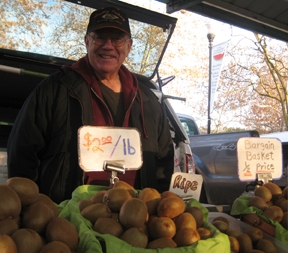
The fuzzy green fruit for sale today from Stenzel's Kiwi Farm was harvested late in October and has been held in cold storage at 32 degrees since then. The fruit will last about six months stored this way, allowing Stenzel to bring out what he needs, grade it by size, let it ripen a little, but sell it while it's still firm. When you bring your kiwis home, let them ripen three or four days more for the best flavor.
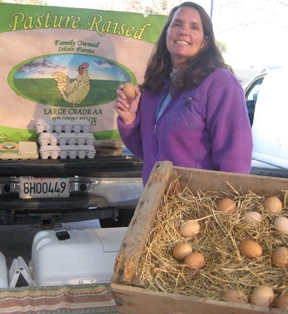
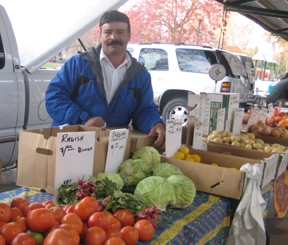
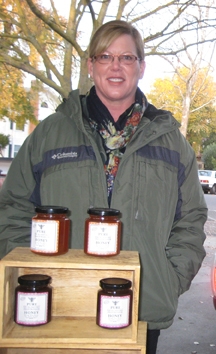
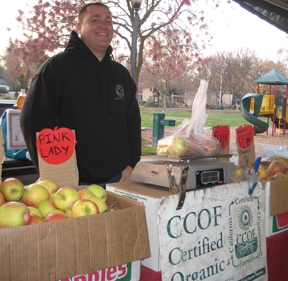
Give it a try - visit your local winter farmers market and learn some new stories!
To find farmers' markets in your community, visit the UC small farm program's California Agriculture Tourism Directory.
The party's ova
Spring is a big time of year for celebrating with a very cheap (cheep?), common, protein-rich food: the chicken egg. And because the hard-boiled egg has a special place at the Seder table and an important role in Easter morning hunts and afternoon picnics, eggs right now are selling like hotcakes. Problem is, the more eggs your market sells, the more likely you are to get them extra fresh, and consequently, the more trouble you're likely to have getting the things to peel when it's time to eat them up.
Chemistry is at the root of the egg-peeling problem: a newly laid egg has a slightly lower, more acidic pH value than the raw egg that you've stored in the refrigerator for a few days. The higher pH of the stored egg allows its white to cling less firmly to the membrane just inside the shell once it is cooked, and less cling means you can get the shell off more cleanly and easily. If you managed to plan ahead and get your eggs five or more days ahead of time this year, good for you! If you didn't, well, better luck next time. Clean-peeling or not, they'll still taste great.
There's a whole lot more to know about eggs than you might imagine—like whether you should wash eggs before you put them in the fridge (you shouldn't), what's the best way to store eggs in the fridge if you want them to last (pointy end down), and whether the refrigerator door egg rack was really such a great invention after all (it wasn't)—and a fun way to learn more is to visit a 4-H Avian Bowl competition at your local County Fair or other 4-H event.
Thanks to the guidance and commitment of UC Extension Poultry Specialist Francine Bradley, California 4-H teams have been doing very well lately in the Avian Bowl, winning first place in the national competition in eight out of the last ten years.
So next time you have a question about eggs or chickens, go find a 4-Her. Just don't ask them which came first. They get that a lot.

brown eggs in the straw
Californians should be careful with eggs
When Bill Clinton was president in the 1990s, his Council on Food Safety identified eggs as a food that poses a risk to children, the elderly and people with compromised immune systems. The Clinton administration launched a safety plan that aimed to eliminate Salmonella contamination in eggs entirely by 2010.
Unfortunately, the goal was not met. This month, a vast outbreak of Salmonella food poisoning prompted the recall of half a billion eggs produced in Iowa. In California, UC Cooperative Extension worked with other agencies and the egg industry to create the California Egg Quality Assurance Program, which is implemented voluntarily by 95 percent of the state’s egg producers. California-produced eggs have been free of Salmonella for the past 10 years.
However, not all eggs sold in California are produced in the state. In fact, the FDA announced this week that Trafficanda Egg Ranch of Van Nuys distributed eggs affected by the recall to grocery stores and foodservice companies in California.
That fact underscores the importance of using basic egg safety measures now and whenever Californians consume eggs, according to UC Cooperative Extension nutrition, family and consumer sciences advisor Cathi Lamp.
“Americans consume an average of 234 eggs per person per year,” Lamp said. “Since infected eggs still make it from the farm to the table, we have more work to do.”
People with health problems, the very young, the elderly and pregnant women (and the unborn child) are particularly vulnerable to Salmonella infections and should be extra careful with eggs, but everyone is advised to take precautions to minimize the risk of being exposed to Salmonella bacteria.
Lamp suggests the following precautions:
- Modify recipes for foods that were traditionally eaten with raw eggs, including smoothies, Caesar salad dressing, Hollandaise sauce, cookie dough, mayonnaise, ice cream and egg nog. If consumers wish to eat foods with "raw" eggs, prepare them with a pasteurized egg product like Egg Beaters.
- At the store, choose grade A or AA eggs with clean, uncracked shells.
- Make sure the home refrigerator is running at 40°F. Store eggs in the coldest part of the refrigerator, not in the door. Don’t wash eggs, as they have a protective coating applied at the packing plant.
- Use raw eggs within three to five weeks. Hard-cooked eggs will keep for one week. Refrigerate leftover cooked egg dishes and use within three to four days.
- Cook eggs until both the yolk and the white are firm. Scrambled eggs should not be runny.
- Casseroles and other dishes containing eggs should be cooked to 160°F (72°C). Use a food thermometer to be sure.
- Wash hands, utensils, equipment and work areas with hot, soapy water before and after contact with eggs and egg-rich foods.
- Avoid keeping eggs or foods containing eggs out of the refrigerator more than 2 hours.

Egg safety can prevent a foodborne illness.
Chickens, chickens everywhere

The amount of attention and care that families spend on their chickens shows that chickens are a labor of love, much as any family pet. Every hen I visited on the Tour de Cluck had a name, and each owner assured me that their “girls” all have their own personalities. Some of the chicken coops were woodworking pieces of art.
Chicken stories are showing up in all types of mainstream media. Feature articles have appeared recently in The New Yorker (Susan Orlean’s home chickens), the New York Times (why Americans raise chickens; women in Berkeley who raise chickens); and a book review of raising chickens in the city), and in the CA&ES Outlook alumni magazine where I work at UC Davis – the College of Agricultural and Environmental Sciences (backyard chicken farming, page 10).
Chickens aren’t difficult to manage, but like raising any animal, the prospective chicken owner should know what he or she is taking on, and should be a responsible animal owner. While it may be fun to muse over the fancy breeds, or to salivate over the thought of fresh omelets each day, it’s important to learn about housing, nutrition, health, local ordinances (which may limit the number of hens and/or the ability to keep roosters), and other pertinent topics.
Where to get information?
- Bookstore shelves are awash with chicken-raising books. Check your local bookstore or online book source. There are even chicken-raising books in the “idiot’s” and “dummies” series (The Complete Idiot’s Guide to Raising Chickens; Raising Chickens for Dummies; and Building Chicken Coops for Dummies).
- Sunset magazine has a useful list of books on raising chickens
- Sunset magazine also has a free download on how to raise chickens
- Backyard Poultry is a popular bimonthly magazine with special topics each month (breeds, health, nutrition, etc.).
- Your local Cooperative Extension or 4-H office should be able to match you up with chicken-raising resources. Here are two University of California sites with information on raising chickens: UC Davis Poultry Page, and ANR publications.
Whatever your reason for raising chickens — and the reasons are many — do your homework first and make sure you get the proper supplies and the breeds that will give you years of pleasure . . . and fresh eggs.